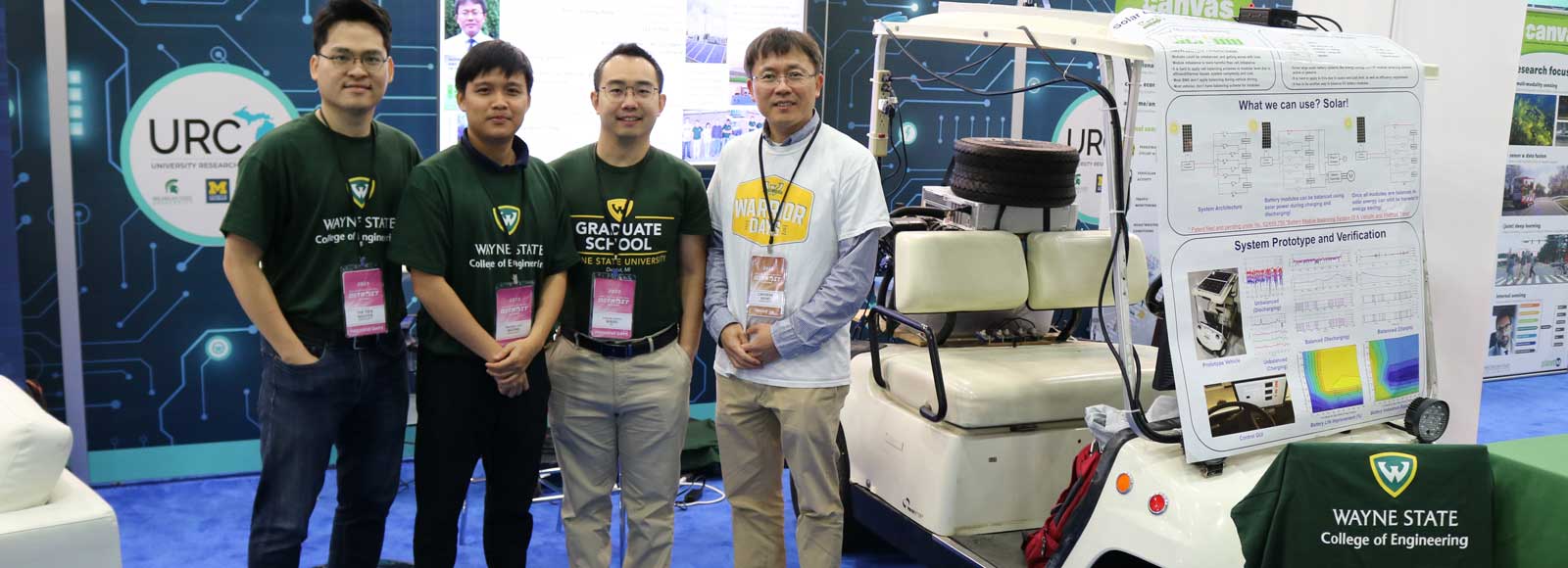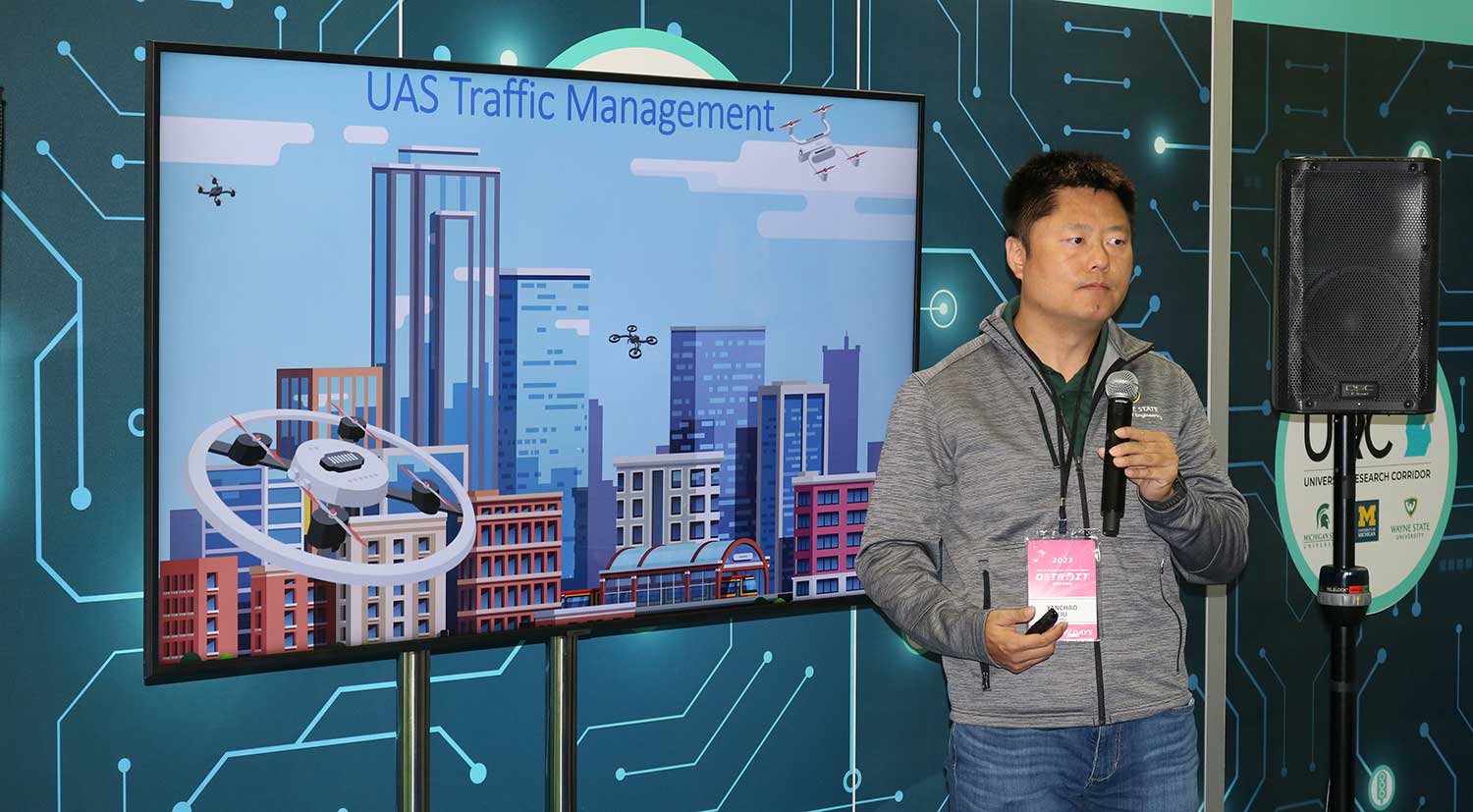Wayne State’s mobility research takes the stage at AutoMobili-D

Faculty and students from the Wayne State University College of Engineering highlighted their wide-ranging research initiatives in the mobility sector during AutoMobili-D, an exhibition at the North American International Auto Show (NAIAS) that showcases new and evolving technologies designed to make mobility safer and more efficient.
Wayne State aligned with its peers from the state’s University Research Corridor (URC) — which also includes the University of Michigan and Michigan State University — to emphasize to media members, industry influencers and other NAIAS Preview Days attendees how their respective institutions are preparing the next generation of the mobility workforce.
The centerpiece of Wayne State’s display was its solar-assisted electric golf cart. The project, which is being developed by electrical and computer engineering students in the lab of Professor Caisheng Wang, was launched by former Ph.D. student Chen Duan, who during his tenure in the automotive industry identified two significant energy challenges.
“First, while we all recognize that adding solar panels to vehicles can greatly enhance their energy efficiency, this practice isn't as widespread as it should be,” said Duan, who is now an assistant professor of electrical engineering at Kettering University. “Second, traditional methods of balancing batteries often lead to the wasteful discharge of energy from high-energy cells to match those with lower energy levels.”

While at Wayne State, Duan developed a cutting-edge technology that harnesses the power of the sun to bridge the energy gaps between battery cells. After three years, he successfully designed a fully functional golf cart that not only balances its battery by charging weaker cells with solar energy, but also charges all cells when they are well balanced.
“This innovation extends the cart's mileage and battery lifespan, all while relying on clean, renewable energy,” he added. “Furthermore, the golf cart can even share excess solar energy with the power grid, contributing to a more sustainable future.”
Several faculty members, including Wang and post-doc researchers, made presentations during AutoMobili-D covering topics ranging from air mobility to nanoscale devices for advanced computing. Dean Ali Abolmaali also joined a URC panel to discuss how Wayne State’s academic programs align with the current and future needs of the state’s mobility industry.
"We are at the forefront of equipping our students with the skills and knowledge needed to thrive in the rapidly evolving field of mobility, ensuring they become the innovative leaders of tomorrow's transportation industry,” said Abolmaali. “Research from our faculty and students, as well as direct input from our industry partners, provides a framework for project-based training using mobility principles and techniques to solve real-world challenges for a wide range of domains, particularly accessibility and infrastructure."

AutoMobili-D coincided with the announcement of a $4.5 million project called eCAT, a National Science Foundation Industry-University Cooperative Research Center (NSF IUCRC) tasked with developing sustainable mobility technologies such as electric vehicle design, autonomous systems, V2X communications and real-time edge computing. As the lead institution, Wayne State is gathering a diverse group of scientists and industry partners interested in closing a gap in synergistic research in these areas.
“This NSF award is clear evidence of our institution's exceptional capabilities and accomplishments in mobility and electric vehicle research,” said Wang, the center’s director. “It serves as a platform to showcase our dedication to pushing the boundaries of knowledge in this crucial field and our unique proximity to the industry.”
The eCAT is the latest example of how Wayne State University has made establishing itself as a leader in mobility a priority given how understanding and implementing these concepts can transform cities and the ways people live and move. The College of Engineering offers a graduate certificate program in mobility as well as graduate programs in electric-drive vehicle engineering and alternative energy technology. Its master of science program in robotics includes a smart mobility track, and new online M.S. programs are being offered in such areas as semiconductor engineering and vehicle energy storage. In 2019, Wayne State and the Michigan Mobility Institute created the Center for Advanced Mobility to further connect industry and academia.